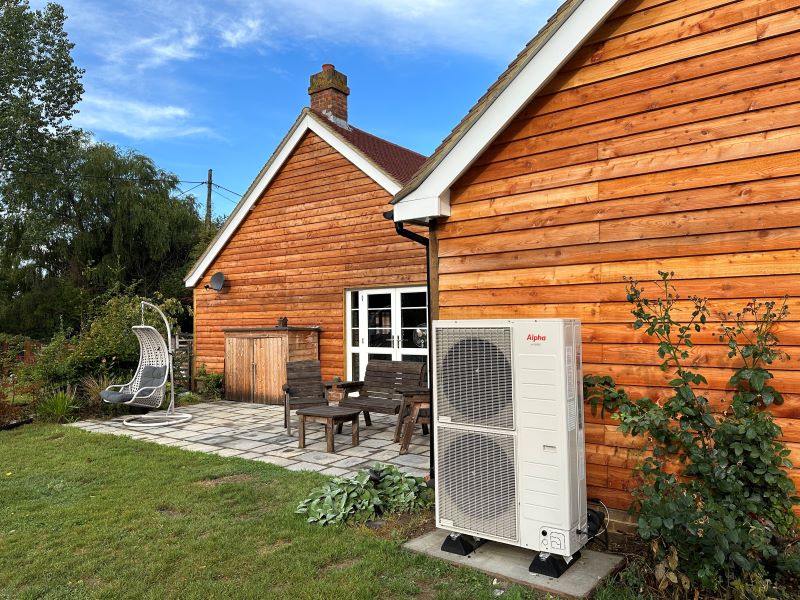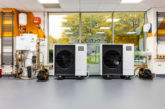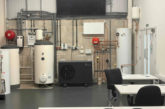
Darran Smith, Technical Manager at Alpha considers what happens to the UK’s extensive gas network in our low-carbon heat future. A managed transition is critical for network operators and households, so should we do more to support the hybrid option for a smooth changeover?
Heat decarbonisation is a critical element of the UK’s journey to Net Zero by 2050. We cannot achieve that goal unless the 85% of UK homes currently using gas boilers make the change to low-carbon alternatives.
Government grants, such as the Boiler Upgrade Scheme (BUS) in England and Wales, aim to encourage households to retrofit heat pumps, and legislation is in place to drive future homes towards this technology. To support the transition to renewable electricity, and the creation of a ‘green’ grid, the government is investing heavily in wind farms, solar and nuclear generation.
However, while all eyes are on the future of renewable generation and development of the electricity grid, we must consider the future of UK’s gas network. Measuring more than 280,000km, it creates a significant challenge. What do we do with a legacy of that scale?
The intention long-term is that the gas network will transition from carrying natural gas to hydrogen. The National Infrastructure Commission, which advises the government, supports a significant role for hydrogen in the industrial sector, but advised the government not to back hydrogen for residential heating.
The result is that while some of the network will continue in its new hydrogen-delivery role, large parts of the gas network are likely to face a diminished future.
The gas network is an interconnected web. A single pipe delivers natural gas to many homes, businesses and public buildings. So, if one or two households along that pipe switch to electric-only heating and hot water, it doesn’t make much difference to the network. However, even if a small number of customers remain on the gas network, the pipes that supply them would need to remain.
Rising costs
In addition, as gas customers switch to electric-only heating, they are removed from the gas network and stop paying the standing charge for gas. That reduces the funds available to maintain the network. Falling customer numbers and a requirement to maintain the network could lead to rising costs for those who remain connected.
Rising gas prices could encourage more people to switch to heat pumps. Yet this assumes an equal level of technical understanding and financial resources in all households, which smacks of unfairness. Again, it also assumes that all homes are suitable for heat pump-only systems, which they are not.
The UK is undertaking an energy revolution, and while the goal of achieving lower carbon emissions is laudable, households will be at the sharp end of uncertainty and shifting prices for at least the next decade. Faced with these problems, it seems sensible to have a range of solutions to hand. As engineers and installers, we know that a single technology is rarely the answer.
Hybrid approach
One solution is the smart hybrid heat pump approach. These systems leverage smart technology to optimise energy use, selecting the most cost-effective energy source — whether gas or electricity — on a minute-by-minute basis.
This would help to smooth out future fluctuations in domestic energy prices for households, as the smart hybrid system automatically ensures the customer is using the cheapest fuel. For the government and gas network operators, it’s an approach that provides a way to phase down the network more smoothly and affordably.
Hybrid systems also make installation much easier, as it’s much more feasible to retain existing radiators (depending on the age of the system). This not only saves costs, but reduces disruption and makes the installation quicker, which also helps installers complete more projects.
Another benefit of the hybrid approach is that keeping a gas boiler in the system means that homes with combi-boilers don’t have to find space for a hot water tank, which is often the case with a heat pump only approach. In addition, the gas boiler can help to meet heating needs in older homes that are harder to insulate to modern standards.
Hybrid heat pumps are not currently widely used in the UK, but they are across Europe. The Association of the European Heating Industry (EHI) describes hybrid heat pumps as: “A no-regret solution for the decarbonisation of buildings,” particularly for the existing building stock.
The EHI also notes that: “Depending on the design and operation, hybrid heat pumps can reduce gas consumption by 60% to 90% in comparison to a boiler alone.”
Although the UK’s Boiler Upgrade Scheme does not currently include hybrid heat pumps as an eligible technology, other European countries include them in some grant schemes including Italy, The Netherlands and France.
Alpha works in the gas boiler and electric heat pump fields, as well as providing hybrid solutions. As a manufacturer with a foot in all camps, we see hybrid heat pumps as an excellent way to encourage greater take-up of the new technology by more households.
This approach not only makes heating more affordable for households but also ensures that domestic heating systems system are adaptable to the evolving energy landscape. As the UK relies less on its extensive gas network, hybrids can offer a critical bridge between the present and future of heating, not only for households but also the network operators and the UK’s Net Zero 2050 objective.













